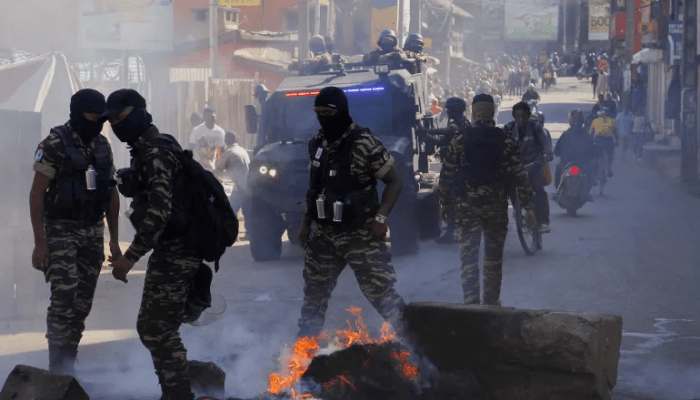Madagascar protest deepens as president appoints new prime minister
Police officers in Madagascar clear a burning barricade after dispersing a crowd during a nationwide youth-led protest [Zo Andrianjafy/Reuters]
Andry Rajoelina, Madagascar’s president, has named a new prime minister in a bid to restore order after weeks of mounting anti-government protests that have rocked the country.
Ruphin Fortunat Zafisambo, a military general, was appointed on Monday, a week after Rajoelina dissolved his cabinet under pressure from demonstrators demanding sweeping political change. But the move appears to have done little to calm tensions. Protesters have vowed to continue until the president himself steps down.
Read also: Youth-led protests shake Madagascar as president vows dialogue but refuses to resign
Tensions flared again on the streets of the capital, Antananarivo, on Monday as police fired tear gas to disperse crowds — many of them university students — marking the start of a third straight week of unrest. Similar scenes played out in other cities, including Toliara and Antsiranana, where local TV footage showed police confronting demonstrators.
The protests began on September 25 over widespread power and water cuts but have since snowballed into a nationwide outcry against corruption, mismanagement and worsening living conditions.
Read also: Three killed as protests erupt in Morocco over stadium funding, poor services
According to the United Nations, at least 22 people have been killed and more than 100 injured since the demonstrations began, figures the government disputes.
The protests are being driven by Gen Z Madagascar, a youth-led movement that describes itself as a peaceful, civic campaign inspired by similar uprisings in Kenya, Nepal and Morocco.
“People don’t have refrigeration for medication, don’t have water for basic hygiene, and then there’s massive corruption,” said Ketakandriana Rafitoson, the global vice chair of Transparency International. “These protests were triggered by visceral grievances that go to the heart of daily life.”
Around a third of Madagascar’s 30 million people have access to electricity, and daily outages often last more than eight hours. The state power company, Jirama, has long been accused of corruption and inefficiency, issues that have fuelled growing resentment against the government.
As the unrest spread, clashes between police and protesters turned violent. Shops were looted, and the homes of several lawmakers were vandalised. Authorities have since imposed a nightly curfew, but demonstrations have continued, with calls for Rajoelina’s resignation gaining traction.
Read also:Nepal reels from deadly protests as army takes control of the streets
Rajoelina, 51, is no stranger to political turbulence. He first seized power in a 2009 coup, promising reform and stability. After stepping aside in 2014, he returned through elections in 2018, positioning himself as a modernising leader.
Now, as public anger mounts, his grip on power faces its toughest test yet.
A government spokesperson told Reuters that officials had tried to engage protesters but failed to find credible representatives to negotiate with. “Unfortunately, despite our efforts, no clear or structured leadership has emerged to engage in constructive talks,” the spokesperson said.
Rajoelina has rejected demands to step down, accusing opposition forces of exploiting public frustrations. “Those calling for my resignation want to destroy our country,” he said in a recent televised address.
For many Malagasy citizens, the crisis reflects years of deepening inequality, economic hardship, and disillusionment with politics. With no clear resolution in sight, analysts warn that the government’s reliance on security forces to quell demonstrations could further inflame tensions.

